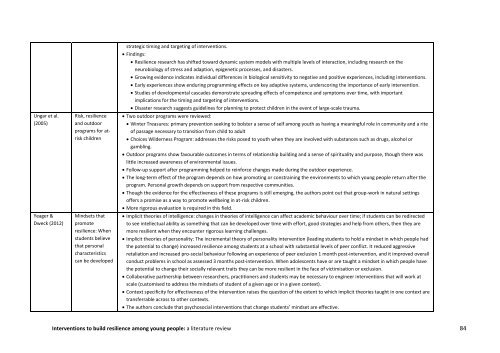Interventions to build resilience among young people A literature review
Interventions-to-build-resilience-among-young-people
Interventions-to-build-resilience-among-young-people
Create successful ePaper yourself
Turn your PDF publications into a flip-book with our unique Google optimized e-Paper software.
Ungar et al.<br />
(2005)<br />
Yeager &<br />
Dweck (2012)<br />
Risk, <strong>resilience</strong><br />
and outdoor<br />
programs for atrisk<br />
children<br />
Mindsets that<br />
promote<br />
<strong>resilience</strong>: When<br />
students believe<br />
that personal<br />
characteristics<br />
can be developed<br />
strategic timing and targeting of interventions.<br />
Findings:<br />
Resilience research has shifted <strong>to</strong>ward dynamic system models with multiple levels of interaction, including research on the<br />
neurobiology of stress and adaption, epigenetic processes, and disasters.<br />
Growing evidence indicates individual differences in biological sensitivity <strong>to</strong> negative and positive experiences, including interventions.<br />
Early experiences show enduring programming effects on key adaptive systems, underscoring the importance of early intervention.<br />
Studies of developmental cascades demonstrate spreading effects of competence and symp<strong>to</strong>ms over time, with important<br />
implications for the timing and targeting of interventions.<br />
Disaster research suggests guidelines for planning <strong>to</strong> protect children in the event of large-scale trauma.<br />
Two outdoor programs were <strong>review</strong>ed:<br />
Winter Treasures: primary prevention seeking <strong>to</strong> bolster a sense of self <strong>among</strong> youth as having a meaningful role in community and a rite<br />
of passage necessary <strong>to</strong> transition from child <strong>to</strong> adult<br />
Choices Wilderness Program: addresses the risks posed <strong>to</strong> youth when they are involved with substances such as drugs, alcohol or<br />
gambling.<br />
Outdoor programs show favourable outcomes in terms of relationship <strong>build</strong>ing and a sense of spirituality and purpose, though there was<br />
little increased awareness of environmental issues.<br />
Follow-up support after programming helped <strong>to</strong> reinforce changes made during the outdoor experience.<br />
The long-term effect of the program depends on how promoting or constraining the environments <strong>to</strong> which <strong>young</strong> <strong>people</strong> return after the<br />
program. Personal growth depends on support from respective communities.<br />
Though the evidence for the effectiveness of these programs is still emerging, the authors point out that group-work in natural settings<br />
offers a promise as a way <strong>to</strong> promote wellbeing in at-risk children.<br />
More rigorous evaluation is required in this field.<br />
Implicit theories of intelligence: changes in theories of intelligence can affect academic behaviour over time; if students can be redirected<br />
<strong>to</strong> see intellectual ability as something that can be developed over time with effort, good strategies and help from others, then they are<br />
more resilient when they encounter rigorous learning challenges.<br />
Implicit theories of personality: The incremental theory of personality intervention (leading students <strong>to</strong> hold a mindset in which <strong>people</strong> had<br />
the potential <strong>to</strong> change) increased <strong>resilience</strong> <strong>among</strong> students at a school with substantial levels of peer conflict. It reduced aggressive<br />
retaliation and increased pro-social behaviour following an experience of peer exclusion 1 month post-intervention, and it improved overall<br />
conduct problems in school as assessed 3 months post-intervention. When adolescents have or are taught a mindset in which <strong>people</strong> have<br />
the potential <strong>to</strong> change their socially relevant traits they can be more resilient in the face of victimisation or exclusion.<br />
Collaborative partnership between researchers, practitioners and students may be necessary <strong>to</strong> engineer interventions that will work at<br />
scale (cus<strong>to</strong>mised <strong>to</strong> address the mindsets of student of a given age or in a given context).<br />
Context specificity for effectiveness of the intervention raises the question of the extent <strong>to</strong> which implicit theories taught in one context are<br />
transferrable across <strong>to</strong> other contexts.<br />
The authors conclude that psychosocial interventions that change students’ mindset are effective.<br />
<strong>Interventions</strong> <strong>to</strong> <strong>build</strong> <strong>resilience</strong> <strong>among</strong> <strong>young</strong> <strong>people</strong>: a <strong>literature</strong> <strong>review</strong> 84


